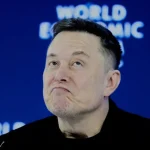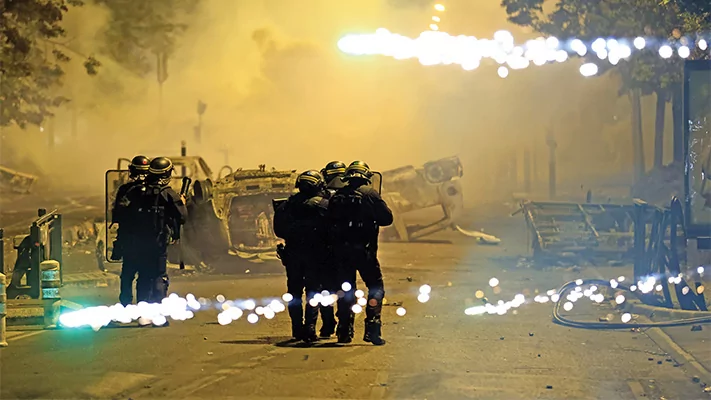
The great cities of Europe are becoming museums. Venice has already completed the transition. Its resident population is now less than a third of what it was in the 1950s. The Venetians whom one meets as a tourist are commuters from the mainland. The Eurodisney complex outside Paris also leaves the lights on at night. When the spectacle is the product, the image must be maintained.
Paris, too, is for lovers of the past. The Louvre is the world’s most visited museum. In 2023, when 5.36 million people visited the Metropolitan Museum of Art in New York City, 8.9 million tramped around the Louvre. This year’s numbers will be higher, for Paris hosted the 2024 Olympics last summer. The opening ceremony, a mixture of cruise ship cabaret and Cirque du Soleil conceptual foolery, confirmed that the French still win the gold medal for being French.

In one tableau, a naked, blue-painted Dionysus was served up on a platter at a banquet for drag queens. Any resemblance to the Last Supper, the artists insisted, was as accidental as the slippage of a drag performer’s right testicle from his latex underwear. The sequence in which the European Union was celebrated in a pansexual disco with a floor of multicolored flashing panels from Saturday Night Fever was merely banal. Europe’s future will probably not resemble New York City in the 1970s.
Permanent standoff
Paris is a repository of Europe’s past, but it is also a laboratory of its future. Its commune (the central city) is as densely populated as Manhattan. The surrounding unité urbaine (the metropolitan area) is the most populous in the European Union. Only metropolitan London is more populous than the Île-de-France region, the “island” that was the kernel of the medieval French state. Immigrants, many of them Muslims, Arabs, and Africans from France’s ex-colonies, are swelling the population.
The state and the “immigrants,” many of whom are, in fact, third- or fourth-generation French citizens, are in a permanent standoff. In June 2023, a traffic stop that led to police shooting a teenage criminal of Algerian-Moroccan background triggered more than a week of rioting and looting across France. The rioters injured more than 800 police officers and torched more than 1,000 buildings and 6,000 cars (“Europe turns right,” July 21, 2023).
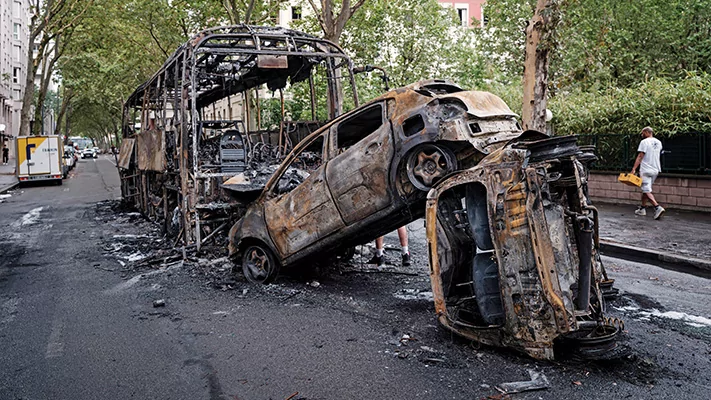
The security preparations for last summer’s Olympics were a soft form of martial law. The interior minister, Gérald Darmanin, described it as “the biggest security challenge any country has ever had to organize in a time of peace.” Paris’s historic center was sealed off from the outside world with 44,000 metal barriers, 30,000 police and gendarmerie officers, and 10,000 soldiers. Roads, bridges, and Metro stations were closed. Residents and workers needed background checks and a QR code to reach their homes and jobs. As the streets emptied, businesses reported their turnover falling by up to 60%.
In America, someone is in charge, but no one knows who they are. In Britain, the feeling is that no one is in charge because the bureaucracy is paralyzed. In Germany, it seems that no one wants to be in charge because that means choosing between America and Russia (“Germany falling,” Feb. 22, 2024). In France, the president is always in charge. Perhaps this, as much as the dividend of prestige brought by the Olympics, is why Emmanuel Macron called snap parliamentary elections last July. No one expected his party to win, just as no one expected Rishi Sunak’s Conservatives to win the British elections a couple of weeks earlier. But it is important to look busy (“The center cannot hold,” June 21, 2024).
In both elections, the new parties of the nationalist Right, Marine Le Pen’s National Rally and Nigel Farage’s Reform U.K., grew their votes. In both, the electoral system produced atypical results. Britain’s first-past-the-post system produced a landslide for a Labour Party whose number of voters had declined since Labour’s 2019 wipeout. France’s two-stage mixture of proportional representation and first past the post is supposed to clarify elections into a contest between the center Right and center Left, but the result split the legislature into three roughly equal groupings, with the fragmented remains of the old centrist parties caught between the nationalist Right and the communist-Islamist-environmentalist Left (“Europe’s double vision,” July 12, 2024).
It took months for Macron to identify a candidate equally offensive to them all. The new prime minister, Michel Barnier, is a vaguely conservative technocrat. Britain’s new prime minister, Keir Starmer, once said he would prefer to be in Davos than in Westminster. Barnier has long shown a preference for Brussels over Paris. As the European Union’s Brexit negotiator after 2016, Barnier gave the British a hard time when they wished to control who crosses their borders. As France’s prime minister, Barnier says he “respects” Le Pen’s anti-immigration politics and compares France’s borders to “a sieve.”
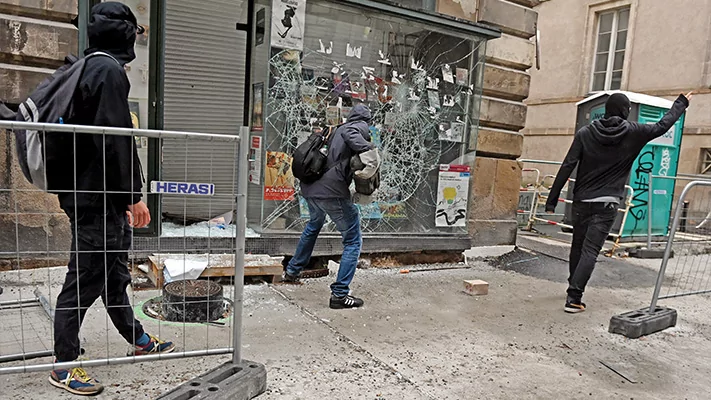
The new Polish prime minister, Donald Tusk, is another ex-EU panjandrum who has profited from the breakdown of national politics. As president of the European Council in the Brexit era, Tusk accused Britain of “cherry-picking” terms with the EU and said pro-Brexit Britons merited a “special place in hell.” As Poland’s prime minister, Tusk invokes the Brexit slogan “take back control” when Poland fends off Russian-sponsored illegal immigration across its border with Belarus. He defies Brussels by refusing to accept the migrant quotas that the EU seeks to impose on its members. He even wants to deny migrants the right to claim asylum, which they are entitled to do under European law.
“The tide has turned,” Barnier explained when he was asked about his reversal. It would be more accurate to say the tide is still turning. The current is running in both directions at once. The surface is choppy and hard to navigate. No one trusts the captain. No one is in a hurry to reach dry land because that means contact with hard realities that Europeans wish to avoid: rapid demographic changes, the rise of Islam and the fall of Christianity, the deterioration of safety on the streets and the decay of public services, the suppression of free speech and the return of heresy laws under the cloak of “anti-racism,” a slow but perceptible shift in manners when it comes to enforcing modesty in female dress or assaulting Jews when the mood arises, and another slow but no less perceptible shift, the long shrinking of Europe’s share of the global economy.
These problems run so deep that no one is sure what to do. No one really wants to name it. At the national level, cynics such as Macron and Barnier see which way the wind is blowing and trim their sails accordingly because they need the votes. Meanwhile, the ship is sinking. Institutional Europe has lost its map and its bearings. Listless, it awaits an escape into fate like the parliament in Constantine Cavafy’s 1919 poem Waiting for the Barbarians.
Why isn’t anything going on in the senate?
Why are the senators sitting there without legislating?
Because the barbarians are coming today.
What’s the point of senators making laws now?
Once the barbarians are here, they’ll do the legislating.
Meet the elites
“France is still a special case,” the political scientist Gil Delannoi said in his office at Sciences Po on the Left Bank. “France had a fairly original democratic model, but it has become very degraded over the decades. Not just because of outside pressures — also because of our previous decisions.”
Delannoi teaches at Sciences Po, the Institute of Political Studies. Its students became legendary as the rioters of 1968. They still go through the radical motions. Paris is damp and rainy in October, so a keffiyeh makes a fashionable variation on the traditional wool scarf. That afternoon, the Israel Defense Forces confirmed the killing of Yahya Sinwar, the architect of the Oct. 7 massacres and kidnappings. In the cafeteria, posters bearing the faces of the missing Israeli hostages are plastered over with the slogan “All eyes on north Gaza” in English. This is the American language and style of post-Black Lives Matter “activism.”
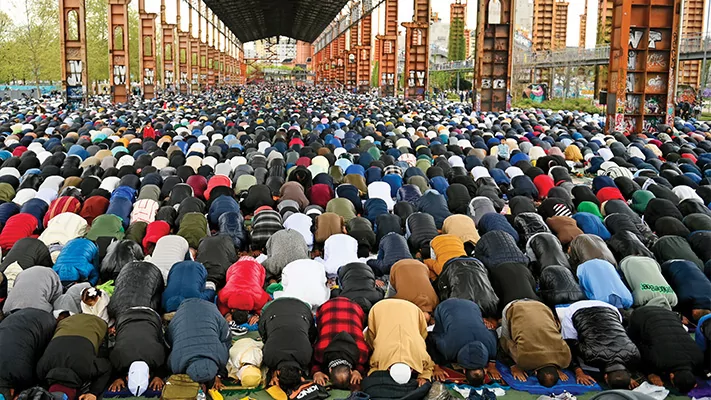
“France has a particular feeling of degradation,” Delannoi continued as we sat in his office. “It’s a little different from what we call ‘the divide between populists and elitists.’ That one is really due to structural, economic, and historical causes. But in France, there is an additional idea: ‘We were at the top of the class, and we’ve now dropped a lot of places. We’re still somewhere — we’re not yet among the least efficient — but we don’t know exactly where we are.’” The most educated and best trained among the young are leaving France. “That may be a sign of open-mindedness, but for the country, it is certainly not a good thing.”
In his 2018 book The Nation Against Nationalism, Delannoi argued that populism is a democratic response to the dilution of national identity and social cohesion due to mass immigration, Islamism, and the pressures of global markets. He also predicted that all it would take to dissolve the dream of a borderless, post-national Europe was a pandemic from Asia. These were still heretical ideas then and suspect in American ears as crypto-Trumpist. Today, everyone is Building Back Better. Every EU state is cherry-picking its obligations to Brussels and bringing back its borders.
The title of Delannoi’s latest book, Sortition, sounds like a Michel Houellebecq novel but is an examination of how one of the earliest democratic procedures, the random drawing of lots in the style of ancient Athens, might restore links between the government and the governed. Athens is always with us when there are barbarians to be waited for. The Athenians used ostraca, pottery fragments bearing the names of candidates, to select who should be punished by exile (hence the English “ostracism”). The judicial attempt to ostracize former President Donald Trump, for instance, is a time capsule of Athenian-style politics. So is the conflict between the democratic and managerial impulses that is pulling apart every Western democracy. Delannoi calls it a “double problem” of “mutual dissatisfaction.”
“There is the dissatisfaction of the populations against the rulers. The people think that the government no longer expresses their will and is even contradictory to it: a sort of super-management that has adapted to a new system,” he said. “I believe that it is clear in at least in all the countries where a minimum of free vote can be expressed.”
“And then there are the various elites,” he continued. “We can characterize them as 15% to 20% of the population, depending on the country, but sometimes up to 30%. They are dissatisfied with the people. They no longer consider them to be electors, or at least people that they are responsible for. Rather, they are obstacles to their projects: the ‘refractory Gauls,’ as Macron called the French.”
Europe’s fifth act
In America, the Democrats seek to replace the constitutional system with the 21st century form of enlightened despotism in the name of “our democracy.” The Republicans are awkwardly changing from being the junior party of the managerial state to refractory defenders of a threatened democratic order. In Europe, however, the constitutional system is enlightened despotism. Institutional Europe does not see democracy as a solution to political disorder but as its source.
Delannoi summarizes the EU’s three-act development. The original, post-1945 project was “Franco-German reconciliation” in the context of the Cold War. This could have become a multilingual federation, such as Switzerland, or even the “United States of Europe” that Churchill wanted. Instead, it grew into an economic community, not least because Churchill’s people joined it. Once the refractory Brits were in, full federation could not work. In the 1970s and 1980s, Europe’s second act was as an economic community mixing “a little bit of protectionism and a lot of free trade.” Delannoi calls it “cosmopolitics on a European scale.”
The third act began in 1990 with the fall of the Soviet empire. The European state-in-making expanded eastward. The EU asserted itself as a global power and adopted a new rationale, economic globalization, and a “no enemies” policy to grease the wheels. This generated large profits on paper but even larger problems in national politics. The democratic backlash against the outsourcing of production and the importing of unskilled labor has become unmanageable.
“It wasn’t the Chinese who created globalization,” Delannoi pointed out. “It was the Westerners who created it. Was it really just for the love of trade? I think it was primarily for political reasons. It was shortsighted to sacrifice the means of production to consumer satisfactions.” It was also shortsighted to imprison Europe’s educated workers and its research base in a “restrictive” protectionist economy. “I don’t know if it was a deliberate error or the type of error that we regret by telling ourselves that we were stupid, that we were wrong,” he said. “These are questions that we can’t answer at the moment. They are taboo.”
Meanwhile, Europe enters a fourth act over which it has little control. EU expansion was supposed to stabilize Europe, but it has become a destabilizing force, an “infinite extension project,” Delannoi called it, whose universal ideology is “quite close to the themes of the Democratic Party in the United States.” Since the Russian invasion of Ukraine in 2022, the EU “cannot deny it has an enemy.” Perhaps Vladimir Putin would have invaded Ukraine regardless, as part of his campaign to restore Russia’s zone of influence. Perhaps the EU antagonized Russia by trying to bring Ukraine inside its borders while the Obama and Biden administrations signaled their openness to Ukraine joining NATO. Either way, Europe has “no army.” It depends on the United States for military protection and Russian and Qatari imports for its energy.
“The principles of economic globalization have made France more of a prey than a powerful actor,” Delannoi observed. The EU now resembles the Holy Roman Empire, a “paralyzing association of states.” Life in Europe is still “sufficiently rich and pleasant” to attract migrants and investment, but Europe’s political and economic development is stalled by design. The EU built a bureaucratic and legal architecture over the heads of the national publics as a bulwark against democratic sentiment. This architecture is working as intended. Immune to democratic dissent, it can only be broken down by external pressures. At the national level, however, the “taboo” is being lifted by public demand. The parliaments that were hollowed out by the European superstate are being revived. National borders are returning, even between Germany and France. Europe’s power balance is tipping east to the Russian front, to Hungary and Poland.
CLICK HERE TO READ MORE FROM THE WASHINGTON EXAMINER
“If National Rally were a party like any other, it would probably have won the parliamentary elections,” Delannoi said. “The electoral system prevented that. Still, its presence in the Assembly now gives it a veto on any policy, unless the center allies itself with [the communist] France Insoumise. That’s unthinkable, not least economically.” National Rally is still not a “normal” party, but “its weight in French politics is starting to be felt.”
The fifth act is where fate has its revenge and the tragedy plays out. Europe’s elites and institutions wait for the barbarians (“Those people were a kind of solution,” Cavafy wrote). Europe’s majority is waiting for the Hungarians: looking for leadership and economic growth, and a path forward from stagnation and disorder, as the demographic clock ticks. “Even enlightened despotism is not irreversible,” Delannoi concluded as an early dusk fell in his office. “It can be swept away by a reactionary revolution, religious or otherwise.”
Dominic Green is a Washington Examiner columnist and a fellow of the Royal Historical Society. Find him on X @drdominicgreen.
